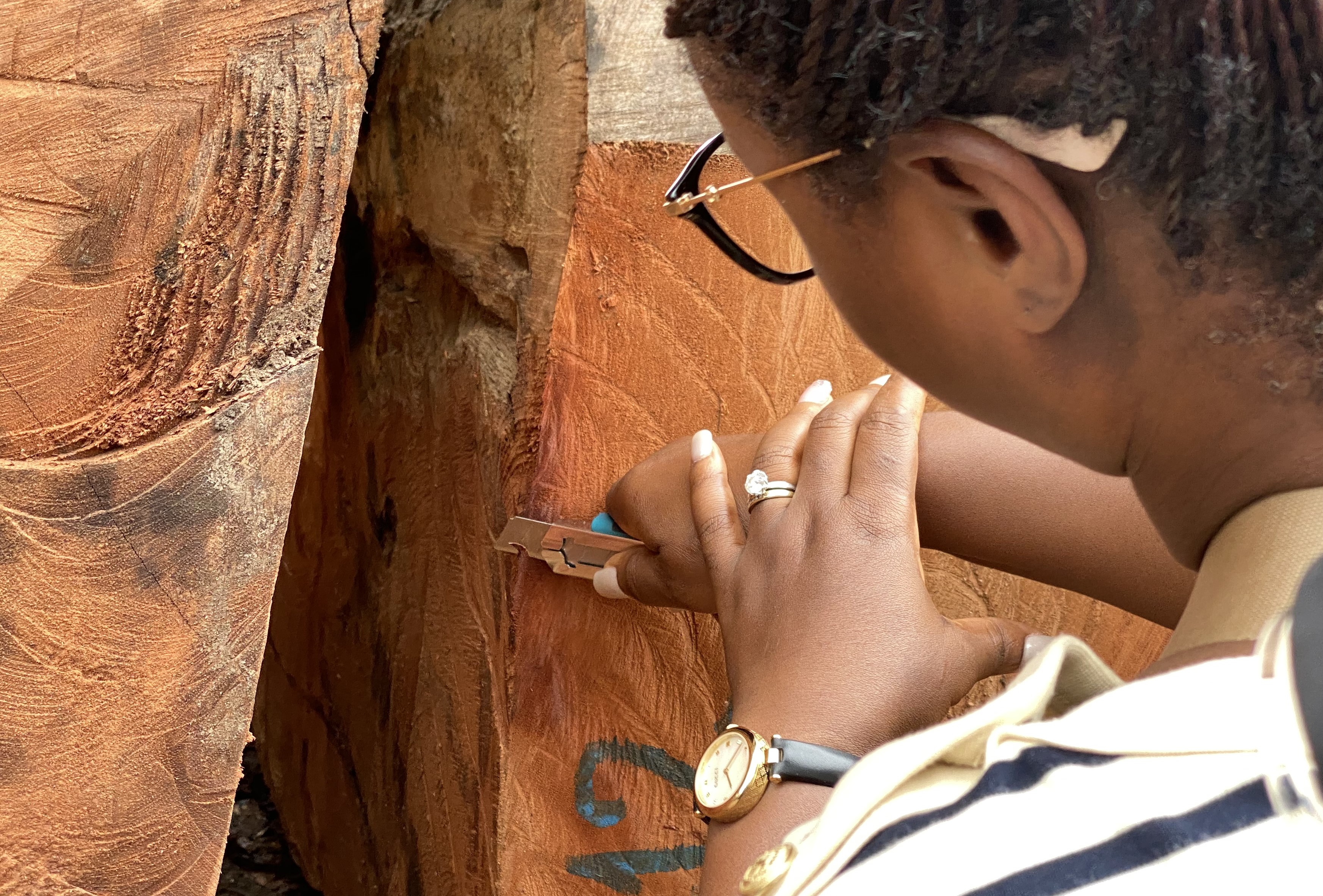Physical Inspection, Wood Identification, Risk Assessment and Forensics: Empowering Law Enforcement Officers to Tackle Illegal Timber Trade in Africa
Kampala, 9 December 2024 – Healthy forests sustain biodiversity, livelihoods, and local economies. Home to most of the planet’s terrestrial species, forests provide millions of people with jobs, along with food and fuel for more than 90 percent of the world’s most vulnerable populations. When forests are threatened, so too are the benefits they provide and the survival of wildlife.
To strengthen responses in addressing illegal trade in tree species listed in the Appendices of the Convention on International Trade in Endangered Species of Wild Fauna and Flora (CITES), the United Nations Office on Drugs and Crime (UNODC), in collaboration with the CITES Secretariat, hosted a Regional Training on Physical Inspection of Timber Shipments and Risk Assessment in Kampala, Uganda, from 25 to 29 November 2024. The training was organized by the UNODC Passenger and Cargo Control Programme (PCCP) with support from the International Consortium on Combating Wildlife Crime (ICCWC) and the European Union-Uganda Forest Partnership, and was possible through generous funding provided by China, the European Union and the United Kingdom.

The specialized training aimed to equip front-line law enforcement such as Customs officers, and CITES authorities from Central, Eastern, and Southern Africa with the knowledge and skills needed to enforce CITES regulations more effectively and ensure the sustainability, legality, and traceability of international trade in CITES-listed tree species. This initiative supports the implementation of CITES Decision 19.90, paragraphs b) and c), and aligns with the outcomes of the CITES Task Force meeting on illegal trade in specimens of listed tree species, which was convened in February 2022.
CITES Secretary-General Ivonne Higuero said: “By enhancing the capacity of frontline officers in regions affected by illegal trade in CITES-listed species to detect illegal timber shipments, identify wood species, and develop national risk assessments, we are supporting Parties in strengthening the implementation of the Convention. This effort reinforces global commitments to conserve biodiversity and promote the legal and sustainable trade of forest products.”
The cooperation between the CITES Secretariat and the UNODC on their PCCP underscores a strong commitment to deliver training by experienced CITES enforcement officials. The PCCP incorporates a multidirectional, holistic approach to combat the escalating threat of illegal deforestation and trafficking. This approach aims to support law enforcement working in key countries affected by the illegal timber trade and to enhance the detection of illegal timber shipments by relevant authorities.
Highlighting the importance of international cooperation to effectively tackle illegal timber trafficking in Eastern, Central and Southern Africa, Sharon Nyambe, Head of the UNODC Office in Uganda, said: "The Regional Training represents an important step in our fight against illegal timber trafficking”. She added: “We’re not just building technical capacity, we’re strengthening the networks and relationships needed to combat these transnational crimes through enhanced collaboration and information sharing.”
The training equipped officers with both theoretical knowledge and practical skills to combat the illegal timber trade. Participants learned to identify and assess risks, detect concealed timber specimens, and verify CITES permits and certificates. They were trained in advanced techniques for physical inspection, forensic timber identification, securing crime scenes and reporting seizure of CITES-listed species. The proof of the training's impact occurred during a full-morning port visit, where participants put theory into practice with the physical inspection of an actual timber shipment. Officers demonstrated their new skills in container inspection, wood species identification, and evidence collection techniques.
"Observing officers from various countries collaborate in real-time to analyze suspicious timber shipments highlighted the true value of Passenger and Cargo Control Programme’s practical training approach. Such hands-on experience is essential for building the confidence and expertise required to effectively detect illegal timber shipments" said Topan Renyaan, PCCP Deputy Regional Coordinator for Southeast Asia and the Pacific. “With over 113 Port Control Units and 23 Air Cargo Control Units across more than 85 countries, PCCP is well-equipped to enhance supply chain security while facilitating legitimate timber trade, providing an additional layer of protection through improved risk profiling and targeting.”
The training also included the integration of genetic methods for timber identification, soon to be established at Uganda’s wildlife forensics laboratory with support from UNODC and its partner, TRACE Wildlife Forensics Network, under the UNODC project “Combating deforestation and forest degradation in Uganda through the criminal justice system,” funded by the European Union through the European Union-Uganda Forest Partnership. This tool will aid in combating illegality in the forestry sector, detecting fraud and enforcing legislation to curb the supply of illegal wood products.
This joint initiative marks a significant step in strengthening the capacity of law enforcement in Africa to combat environmental crime and safeguard the region’s valuable forests. The CITES Secretariat is working closely with ICCWC partners to implement training on physical inspection of timber shipments in regions significantly affected by illegal trade in CITES-listed tree species. In previous years, this was combined with ongoing support provided by ICCWC to West and Central Africa. This training was developed as part of the third phase of support based on lessons learned and additional needs identified.
____________________
Editor’s Notes:
For media enquiries, please contact cites-media [at] un.org (cites-media[at]un[dot]org)
For general enquiries, please contact info [at] cites.org (info[at]cites[dot]org)
About ICCWC:
ICCWC - The International Consortium on Combating Wildlife Crime.
ICCWC is a unique partnership of five intergovernmental organizations – The Secretariat of the Convention on International Trade in Endangered Species of Wild Fauna and Flora (CITES), the International Criminal Police Organization (INTERPOL), the United Nations Office on Drugs and Crime (UNODC), the World Bank Group (WBG) and the World Customs Organization (WCO).
Through technical assistance, tools, training, and operational support, ICCWC works along the entire criminal justice chain, building the capacity of frontline law enforcement in countries and regions around the world affected by wildlife crime.
Find out more:
iccwc-wildlifecrime.org.
About CITES
The Convention on International Trade in Endangered Species of Wild Fauna and Flora (CITES) was signed on 3 March 1973 and entered into force on 1 July 1975. With 184 Parties (183 countries + the European Union), it remains one of the world's most powerful tools for wildlife conservation through the regulation of international trade in over 40,900 species of wild animals and plants. CITES-listed species are used by people around the world in their daily lives for food, health care, furniture, housing, tourist souvenirs, cosmetics or fashion. CITES seeks to ensure that international trade in such species is sustainable, legal and traceable and contributes to both the livelihoods of the communities that live closest to them and to national economies for a healthy planet and the prosperity of the people in support of UN Sustainable Development Goals.
Follow CITES on social media:
Find out more: https://cites.org/eng
About PCCP
The UNODC-WCO-INTERPOL Passenger and Cargo Control Programme (PCCP) contributes to improving the capacity of Member States and their law enforcement agencies active at air, sea and land borders, to disrupt illicit flows of containers, cargo and mail, intercept high-risk passengers and identify victims of trafficking, while facilitating legitimate trade and the movement of people. The PCCP supports a global network of over 170 units composed, as relevant, of customs and law enforcement authorities in 86 countries worldwide. Through enhanced risk assessment and inspection capabilities, these units focus on targeting suspicious containerized shipments, intercepting high-risk passengers, and combating illicit trafficking via cargo, postal mail, and general aviation.
Follow PCCP on social media:
Find out more: https://www.unodc.org/unodc/en/ccp/
Find out more: https://www.unodc.org/unodc/en/organized-crime/AIRCOP/1-aircop-home.html



